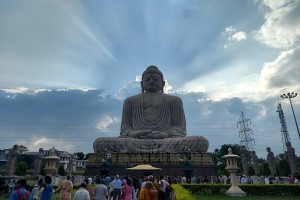
Counterpoint: If Buddha were here
The world today is standing on the threshold of nuclear holocaust. The latest escalation of tensions between Iran and America, and the killing of innocents in Gaza, does not augur well for the world. Ostensibly, when the world is negotiating with this calamitous outbreak of a third world war, there is a singular hope in the teachings of Buddha as an antidote to reverse this maddening frenzy, which is seeking to engulf the whole world in its dystopian tentacles.
‘Buddh not yuddh (war)’ provides a remedy to the scorching world awaiting its self-annihilation. It is the perfect antidote to the ongoing feast of frenzy surrounding the war today across the Middle East and Europe. In short, the Buddha’s prescription alone can bring the cessation of ongoing war and its degeneration into the third world war. He, against this backdrop, has spoken for humanity as a whole.
Lord Buddha’s teachings are the most perfectly oriented towards human welfare, and this is a reason that I have veneration for the Tathagata Buddha. As a scholar, with a spiritual bent of mind, especially with decades of my studies and churning out thoughts, I intrinsically feel that no one spoke with such clarity of thought as the Buddha did.
I sincerely feel that the path to human liberation only passes through the silence that the Buddha taught, not the cacophony which unfortunately has become so resounding today. His sunlit teachings of ‘Human First’ alone can save humanity from the precipice of an impending doom. Incidentally, His eightfold noble path, resulting in Dhamma, alone can provide the calm and peace to the world which has irreversibly taken to violence for its self-destruction. His sunlit thoughts encompass humanity as one unit in the realistic sense.
I embrace the resplendent philosophy of the Buddha of ‘entire humanity being one’ which He taught and practiced in His life. In His famous conversation with Singh Senapati, when the latter had sought to know about God and Creator, the Buddha instantly shot back, ‘Singh Senapati, the human life is very short; to squander it on the futile questioning on the existence of some supernatural power is the wanton exercise, which seldom results in any tangible gain. What I prescribe is the resplendent path towards human liberation.’
Unequivocally, the Buddha only spoke for the ultimate welfarism of humanity. Small wonder then, even great Adi Shankaracharya remarkably converges with the Buddha’s thought process, where his exposition of pure consciousness has a remarkable resemblance with the Buddha’s void or emptiness. Adi Shankara is very legitimately referred to as Crypto Buddha, where much like the Buddha, he too has rejected the existence of any purported God. The great author Rahul Sankrityayan, despite his Brahminical roots, finally took recourse to the Buddha for his ultimate salvation!
Ostensibly, the Buddha had emphasised the state of mindfulness, which connotes dwelling in the very moment, for neither the past exists, nor the future; what exists is the very moment in which we dwell. Thus, living from moment to moment is the desirable prescription for humanity.
Drawing an analogy from the Buddha’s prescription, Ruchira Patni, alias Ruchira Kamboj, a Woman IAS topper, famously said: “Present is the cash, past is the cancelled cheque and future is the promissory note.” However, the Buddha’s philosophisation has no future embedded in it, nor does any past exist; it has only the given moment. This vision is premised on the belief of stark uncertainty, which is inherent in human life. Unequivocally then, the human mind should neither dwell on the past events, nor should it be anchored on the future which is yet to transpire. Besides, He had emphatically articulated that impermanence is the characteristic hallmark of this world; no sense of attachment should be developed with the worldly phenomenon, for attachment engenders the cause for misery.
In other words, the Buddha had primarily focussed upon the sense of tenancy of human beings on earth. The false sense of ownership of worldly phenomena unfolds misery for humanity. No wonder, realising intrinsically the impermanent nature of human being, He chose the path of renunciation for himself, his step-brother and his son. The material possession, which a normal human being so overwhelmingly covets, was considered to be the unconscionable burden upon the mind and heart by Him — the blissful life follows the path of renunciation, not in possession of material richness.
With the benefits of hindsight, I evocatively correlate the doctrinaire belief of ‘Satyamev Jayate‘, with the life of the Buddha, a life sans any facades, any form of pretences or ostentation. His enlightened thought process is the most invigorating thought to have ever been taught to humanity. To take recourse to Him tantamounts to upholding the pristine glory of humanity, for only He upheld the pristine glory of humanity in its purest form. Significantly, I have begun viewing humanity from the prism of the Buddha’s perspective, where seldom any inequality exists; where the entire humanity is one; where the oneness of the universe becomes self-ostensible in its pristine form, the way the Creator had envisaged His Creation to be like.
*Vivekanand Jha is the author of an upcoming book Buddh Not Yuddh. The views published are personal.




